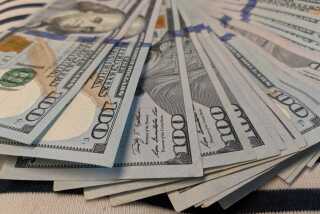Jittery Markets Belie Strength of the Economy
The first thing to keep in mind is that things are better than Tuesday’s stormy currency and stock markets made them appear. The dollar’s value fell sharply against the Japanese yen, West German mark and other major currencies and that unsettled the stock market, which took a nose dive, declining 45.91 points on the Dow Jones industrial average.
The problem was jitters in the international currency markets over the latest U.S. trade figures, which showed a growing deficit for June and indicated that the gap between U.S. imports and exports might not narrow at all this year. That worried currency traders. It is now almost two years since the world’s major nations got together to force a decline in the dollar’s value, hoping to spur U.S. exports by making them more affordable, and curb imports by making them more expensive.
But with the deficit still huge after a 40% decline in the dollar, traders were concerned that the dollar would have to fall further or that the U.S. Congress would produce protectionist trade legislation this year.
Change in World Commerce
Either way lay danger. The dollar could go into free fall--declining, say, to 100 yen to the dollar. That would halt Japanese exports or bankrupt Japanese exporters or both. But injury is seldom one-sided in today’s world. Losses by Japanese and other foreign investors in U.S. investments would be severe and, as they pulled their money out, U.S. markets could collapse. The effect on world commerce would be catastrophic.
But the sky isn’t falling. The U.S. trade deficit isn’t going to lead to world catastrophe. And as for the U.S. dollar, the consensus of several currency experts is that its value could strengthen from here. In fact, predicts Pierre Rinfret, an economic consultant who has advised both Republican and Democratic administrations, the dollar will rise to about 160 yen (from around 145 on Tuesday) and strengthen against other currencies, even though trade deficits are likely to continue for some time. “Trade and currency,” he says, “are two different problems that are related only in a minor way.”
David Jones, research director of the government securities dealer Aubrey Lanston & Co., agrees. There has been a fundamental change in world commerce, he says, and “the old-fashioned ways of adjusting trade balances don’t work.” He means that in today’s world where U.S. and foreign firms produce goods that are an amalgam of parts made domestically and overseas, it is difficult to close an export-import gap by adjusting the currency.
If Honda produces cars in Ohio but imports some of the parts from Japan, or Ford produces some cars domestically and other cars overseas, traditional trade patterns don’t apply. Nor is the trade deficit necessarily a sign of U.S. economic or technological weakness. On the contrary. We run a trade deficit in telecommunications equipment, for example, an area in which U.S. technology is second to none.
Attractive Market
Why is that? One reason is that other nations use protectionist policies to keep U.S. equipment out--an economic injustice that the U.S. government can correct by demanding open markets abroad as quid pro quo for access to this market.
But the more interesting reason that we import more telecommunications gear than we export is that the U.S. telephone equipment market is growing faster than anywhere else, and so the world’s producers are flocking in.
That’s the other side of the ledger on the trade deficit that the jittery currency traders weren’t looking at. The U.S. economy is doing quite well these days. On the same day last week that the Commerce Department reported the June trade deficit, the Federal Reserve Board reported a strong rise in industrial production and the Labor Department released wholesale price figures showing that inflation is dormant--even as unemployment has reached its lowest levels in years.
That economic growth--aided by the age of our population, large numbers in their 30s and early 40s--has more effect on the value of the dollar than questions of trade, says Deborah Olivier of the Claremont Economics Institute. The healthy economy is one reason foreigners want to invest their money here--as they did so eagerly last week when Japanese investors rushed in to buy more than 40% of the U.S. Treasury’s offering of 30-year bonds.
Foreign investors also have been building or buying plants in the United States, and pouring money into the stocks of U.S. companies--one reason the market rose to unprecedented heights in the last two weeks. Such investments spell confidence in the U.S. economy--and offer a better perspective than Tuesday’s jittery markets on things as they really are.
More to Read
Inside the business of entertainment
The Wide Shot brings you news, analysis and insights on everything from streaming wars to production — and what it all means for the future.
You may occasionally receive promotional content from the Los Angeles Times.










